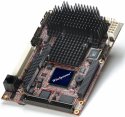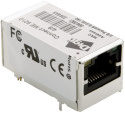Adobe unleashes 64-bit Flash
November 17, 2008 Adobe released a 64-bit alpha Linux version of its Flash Player 10 media software, and announced a partnership with ARM on an ARM11 version of Flash 10. Other Adobe news includes AIR 1.5 for Linux, upgraded media servers, and a new design tool called Flash Catalyst. (more…)
Adobe released a 64-bit alpha Linux version of its Flash Player 10 media software, and announced a partnership with ARM on an ARM11 version of Flash 10. Other Adobe news includes AIR 1.5 for Linux, upgraded media servers, and a new design tool called Flash Catalyst. (more…)
 [Updated Nov. 26] — As netbooks and MIDs proliferate, more Linux device developers are using software and tools from the Intel-sponsored Moblin.org project. Aimed at developers, the free tools let most anyone with a little configuration and compiling experience easily build their own Linux…
[Updated Nov. 26] — As netbooks and MIDs proliferate, more Linux device developers are using software and tools from the Intel-sponsored Moblin.org project. Aimed at developers, the free tools let most anyone with a little configuration and compiling experience easily build their own Linux…  WinSystems announced an EPIC-format, extended-temperature single board computer (SBC) that runs Linux. Aimed at industrial applications, the EPX-855-G is equipped with an Intel Celeron-M clocked at 1GHz (fanless) or 1.8GHz Pentium (fan), and can operate at temperatures ranging from -40 to 158 degrees F.
WinSystems announced an EPIC-format, extended-temperature single board computer (SBC) that runs Linux. Aimed at industrial applications, the EPX-855-G is equipped with an Intel Celeron-M clocked at 1GHz (fanless) or 1.8GHz Pentium (fan), and can operate at temperatures ranging from -40 to 158 degrees F.  Yellow Dog Linux distributor Terra Soft has been acquired by fellow Cell Broadband Engine (Cell BE) specialists Fixstars Corp. Terra Soft, whose Yellow Dog Linux (YDL) distribution supports both PowerPC and Cell BE platforms, will be recast as a subsidiary called Fixstars Solutions, says…
Yellow Dog Linux distributor Terra Soft has been acquired by fellow Cell Broadband Engine (Cell BE) specialists Fixstars Corp. Terra Soft, whose Yellow Dog Linux (YDL) distribution supports both PowerPC and Cell BE platforms, will be recast as a subsidiary called Fixstars Solutions, says…  [Updated Nov. 26] — Mobile Internet devices (MIDs) and other small form-factor systems based on Intel Atom processors and the Intel-sponsored Moblin.org Linux stack are finally starting to arrive.
[Updated Nov. 26] — Mobile Internet devices (MIDs) and other small form-factor systems based on Intel Atom processors and the Intel-sponsored Moblin.org Linux stack are finally starting to arrive.  Texas Instruments (TI) is demonstrating a tiny video projector that could prove small enough to embed in devices such as mobile phones. The 10-lumen “Pico” projector uses TI's DLP (digital light processing) technology, and is shown rendering a Linux desktop playing 24-bit RGB video at 60Hz.
Texas Instruments (TI) is demonstrating a tiny video projector that could prove small enough to embed in devices such as mobile phones. The 10-lumen “Pico” projector uses TI's DLP (digital light processing) technology, and is shown rendering a Linux desktop playing 24-bit RGB video at 60Hz.  Performance Technologies (PT) is shipping two communications controllers that use the AMC (advanced mezzanine card) form factor. The Linux-ready AMC304 and AMC305 enable PT's ATCA (AdvancedTCA) and MicroTCA systems to interface with leased T1/E1/J1 lines, while the AMC305 provides time-division multiplexing (TDM) transmission…
Performance Technologies (PT) is shipping two communications controllers that use the AMC (advanced mezzanine card) form factor. The Linux-ready AMC304 and AMC305 enable PT's ATCA (AdvancedTCA) and MicroTCA systems to interface with leased T1/E1/J1 lines, while the AMC305 provides time-division multiplexing (TDM) transmission…  It appears that Debian 5.0 (aka “Lenny”) will soon take its big binocular eyes out into the wider world. The Debian project has completed the first release-candidate of Lenny's installer, which features much-improved support for ARM-based devices, along with much faster installation from “live” CDs.
It appears that Debian 5.0 (aka “Lenny”) will soon take its big binocular eyes out into the wider world. The Debian project has completed the first release-candidate of Lenny's installer, which features much-improved support for ARM-based devices, along with much faster installation from “live” CDs.  Canonical announced it will port Ubuntu Desktop Linux to the ARMv7 architecture. Targeted at netbooks, the Ubuntu ARM distribution could set the stage for Intel to lose the “software advantage” that has enabled x86 to shrug off attacks from other architectures for the last 30 years.
Canonical announced it will port Ubuntu Desktop Linux to the ARMv7 architecture. Targeted at netbooks, the Ubuntu ARM distribution could set the stage for Intel to lose the “software advantage” that has enabled x86 to shrug off attacks from other architectures for the last 30 years.  MontaVista has confirmed that its Linux stack is in new music phone from Motorola. Leaked details on the EM35 reveal a slider version of the EM30 music phone, making it perhaps the last of Motorola's in-house Linux phones, with Android and possibly LiMo phones to follow.
MontaVista has confirmed that its Linux stack is in new music phone from Motorola. Leaked details on the EM35 reveal a slider version of the EM30 music phone, making it perhaps the last of Motorola's in-house Linux phones, with Android and possibly LiMo phones to follow.  An Estonian embedded design house has developed a data-collection barcode scanner and PDA with an OLED display. Billed as the first OLED-equipped mobile terminal device, Artec's Triskan TS8 Professional Mobile Terminal runs embedded Linux on an ARM processor, and includes Bluetooth and GSM/GPRS, with optional WiFi.
An Estonian embedded design house has developed a data-collection barcode scanner and PDA with an OLED display. Billed as the first OLED-equipped mobile terminal device, Artec's Triskan TS8 Professional Mobile Terminal runs embedded Linux on an ARM processor, and includes Bluetooth and GSM/GPRS, with optional WiFi.  [Updated 1:45PM] — Digi International will update its RJ-45 jack-sized Connect ME device server. Available in December with Linux cross-development tools, the Digi Connect ME 9210 offers a faster ARM9 processor and serial data rates, while adding a serial peripheral interface (SPI), I2C, and cryptography hardware.
[Updated 1:45PM] — Digi International will update its RJ-45 jack-sized Connect ME device server. Available in December with Linux cross-development tools, the Digi Connect ME 9210 offers a faster ARM9 processor and serial data rates, while adding a serial peripheral interface (SPI), I2C, and cryptography hardware.